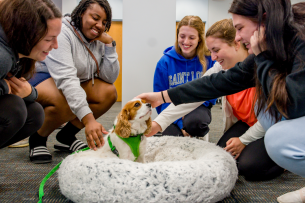Filter & Sort

Investing in Student Wellness as a Retention Concern
As college students continue to struggle with generalized anxiety and depression, higher education practitioners can learn the signs of distress to better support student flourishing.

Student Wellness Tip: Therapy Dogs Ease Academic Stress for Nursing Students
Many colleges welcome therapy dogs to campus to support students, especially during exam times, but measuring the impact is less common. A recent pilot study found therapy dogs can decrease student stress when they are present in the classroom throughout the term.

Student Wellness Tip: Engage Men in Bystander Intervention
Prior research shows college-age men are often excluded from conversations around sexual assault prevention. A new report offers recommendations for colleges and universities on how to increase male student participation.

Report: Colleges Get Creative in Health and Wellness Solutions
Student health and wellness remain a priority for higher educational leaders, as highlighted in a new report. Officials share their unique approaches to servicing the eight dimensions of wellness.

Student Wellness Tip: Broaden Suicide Prevention Efforts
Higher education leaders can recognize September as Suicide Prevention Month by prioritizing mental health and belonging at their college or university.

Success Program Launch: Free Tablets, Hotspots for Low-Income Learners
A university provides students living at or below the poverty line with a tablet and hotspot at no cost to the learner to use for schoolwork and life beyond college.

Allergen Program Provides Comfort and Confidence in Dining
Duke University’s “Ask Me” allergen program trains dining staff to serve as allergen experts, creating a safer environment for students with food allergies.

Student Wellness Tip: Support Tech Breaks, in Class and on Campus
Helping students to disconnect involves encouraging self-reflection on technology use, no-tech class activities and apps and phone settings that provide motivation for more no-mobile-device time.
Pagination
Pagination
- 11
- /
- 20